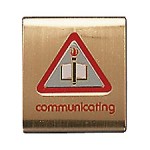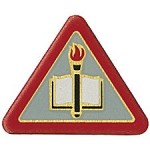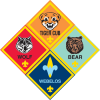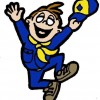Belt Loop
Complete these three requirements
- Tell a story or relate an incident to a group of people, such as your family, den, or members of your class.
- Write and send a letter to a friend or relative.
- Make a poster about something that interests you. Explain the poster to your den.
Academics Pin
Earn the Communicating belt loop and complete five of the following requirements.
- Write an original poem or story.
- Keep a journal of daily activities for at least seven days.
- Listen to a news story on television or the radio. Discuss the information with an adult.
- Go to the library. Use the card catalog or computer reference system to find a book, and then check it out.
- Read a book that has been approved by your parent or teacher. Discuss the book with an adult.
- With a friend, develop a skit. Perform it at a Scout meeting, family meeting, or school event.
- Learn the alphabet in sign language and demonstrate it to your den or an adult family member by showing how to sign 10 words. (See page 56.)
- With an adult, use the Internet to search for information on a topic of interest to you.
- Watch three television commercials and discuss the information in them with your parent or den leader.
- Read the directions for a new game. Explain to a family member or friend how to play it.
- Learn about “reading” materials for people who have poor vision or who are blind. Tell your den or an adult family member about what you have learned.
- While traveling, make a list of road signs, animals, or license plates that you see. Tell your den or an adult family member about what you have learned
Additional Information
Habits of Good Writers
- Decide on the topic you are going to write about.
- Brainstorm—think of what you are going to say about the topic.
- Make up a plan for how you are going to organize your ideas on the topic.
- Write down your ideas as clearly as you can.
- Reread your first draft to be sure you have said everything you wanted to say as clearly as possible.
- Make any changes so that your reader will understand exactly what you are trying to say.
- Edit your work for spelling, punctuation, and correct grammar.
Habits of Good Readers
- Recognize the words on the page.
- Know the meanings of the words.
- Think about the ideas of the story.
- Use the information you already know to understand what you are reading.
A Fistful of Words
- Pick a page of a book or magazine you want to read.
- Look at each word on that page. Begin to make a “fist” of words you don’t recognize. For each word that you don’t recognize, bend one of your fingers down.
- If all five fingers are down, that is, if you have made a fist before you come to the last word on that page, then you have a “fistful of words” that you do not know. That is a sign that you probably will need some help in reading that book.
Resources
Check out your local and school library, as well as a local university or community college for resources on communicating.
International Reading Association
800 Barksdale Road
P.O. Box 8139
Newark, DE 19714-8139
Toll-free phone: 800-336-7323
Fax: 302-731-1057
Web site: http://www.reading.org
National Institute for Literacy (NIFL)
1775 I Street, NW, Suite 730
Washington, DC 20006-2401
Phone: 202-233-2025
Fax: 202-233-2050
Web site: http://www.nifl.gov
Sources for Children With Reading or Learning Disabilities
National Library Service for the Blind and Physically Handicapped (NLS)
Library of Congress
Washington, DC 20542
Phone: 202-707-5100
Fax: 202-707-0712
Web site: http://lcweb.loc.gov/nls
Office of Special Education Programs (OSEP)
U.S. Department of Education
400 Maryland Ave., SW
Washington, DC 20202-7100
Phone: 202-245-7459
Web site: http://www.ed.gov/about/offices/list/osers/osep/index.html
Learning Disabilities Association of America
4156 Library Road
Pittsburgh, PA 15234-1349
Phone: 412-341-1515 and 412-341-8077
Fax: 412-344-0224
Web site: http://www.ldanatl.org
American Sign Language
http://www.lifeprint.com/






